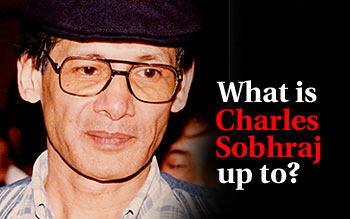Home > News > Specials
The Rediff Special/Onkar Singh
October 06, 2003

When the Nepalese police announced the arrest of 'bikini killer' Charles Gurmukh Sobhraj from the Royal Casino in Kathmandu's Yak Yeti Hotel on September 19, there was a flutter in Delhi police circles, particularly in Tihar jail, where the man known as 'The Serpent' had been incarcerated for more than 20 years before he was deported to France in 1997.
V D Pushkarna was deputy superintendent of Jail 3 when Sobhraj ordered sweets for the staff on March 16, 1986, on the pretext of celebrating his birthday. "He had drugged the sweets and offered them to the policemen on duty at the main gate," Pushkarna remembers. "He simply took the keys from the security men once they collapsed and walked out."
Sobhraj had selected carefully the day and time of his escape. It was a Sunday and he knew there would be just skeletal staff between 1300 and 1500 IST, Pushkarna recalled in a conversation with rediff.com
Pushkarna was one of eight officials suspended for dereliction of duty along with the superintendent of Jail 3, B L Vij, who died a couple of years ago.
Sobhraj was implicated in more than 20 murders in various countries, including Thailand, Nepal and India. His modus operandi was to befriend the victims, then drug them, rob them, and strangle or even burn them.
 | The Saga of Charles Sobhraj |  | |
|
The law finally caught up with him in 1976 when he was arrested in connection with the murder of a French tourist, Luc Salomon, who was poisoned in a hotel in the Moolchand locality of south Delhi, a police officer who investigated the 1986 jailbreak told rediff.com
When Sunil Kumar joined as law officer at Tihar Jail in 1981, Sobhraj had already made his presence felt. "He was virtually ruling the roost," says Kumar, "and would threaten, intimidate, and blackmail people to get his work done. If he had a small tiff with a jail official, he would threaten to file a petition against him in the Delhi high court.
"He had forged an alliance with Sunil Batra and Vipin Jaggi [who were arrested for Delhi's first big bank robbery back in 1973]. The trio by virtue of their qualifications and knowledge of law would encourage the jail inmates to file petitions against the officials. He had filed more then 50 petitions in the Delhi high court. Jail officials used to tremble before him. He would have his way most of the time."
Before Sobhraj escaped he would move virtually anywhere within Tihar as if he were an officer on inspection, not a prisoner. He would sit in a chair in the jail superintendent's presence and have tea with him.
"He was excellent at making friends," criminal lawyer V K Ohri, who represented Sobhraj in several cases, remembers. "He was particularly friendly with journalists visiting him in jail. His knowledge of French helped him befriend unsuspecting French tourists who were later killed after they had served his purpose."
Ohri says Sobhraj had a nexus with criminals outside and managed to get whatever he wanted either by persuading the jail officials or threatening them. He would sell his interviews through friends in the media for as much as $5,000. "A lady advocate was so charmed by him," he recalls, "that she had agreed to join Sobhraj in Goa after the jailbreak. But the police arrested her before she could do so."
Even after Sobhraj was deported to France in 1997, Ohri said the criminal kept in touch with his lawyer on the telephone.
In jail, Sobhraj -- born of an Indian father and Vietnamese mother -- would buy his comforts by bribing officials. Fellow inmates called him 'Sir Sobhraj' for his skills in managing things that were not allowed by the jail manual.
"Things changed after he was arrested after the jailbreak by Mumbai police officers in Goa and brought back to Delhi," says Ajay Aggarwal, current Director General of Police, Tihar. "Sobhraj was kept in an isolated cell and not allowed to move out or mix with other inmates. He was handcuffed and fettered.
But even that did not break his spirit. By escaping he had made sure he would not be deported to Thailand."
Sobhraj broke out of Tihar nearly at the end of his first jail term. He would have been extradited to Thailand after his jail term to face charges of murder there. Thai justice is brutal and swift -- he faced the death penalty for crimes committed on Thai territory. The 1986 jailbreak added fresh charges against Sobhraj and eventually another jail term. By the time he was released from Tihar in 1997 the 20-year time-frame to try him for his crimes in Thailand had lapsed.
Those who have known Sobhraj closely for many years are unwilling to believe that he could have been caught by the Nepalese police so easily. "I am convinced there is more to it than meets the eye," a former officer of the Central Bureau of Investigation said. "A man who could plan his jailbreak so immaculately that someone took his pictures when he walked out of Tihar in 1986 must have an ace up his sleeve. Only he would know the truth."
Image: Dominic Xavier
Also Read: Crime is in Sobhraj's blood -- Madhukar Zende